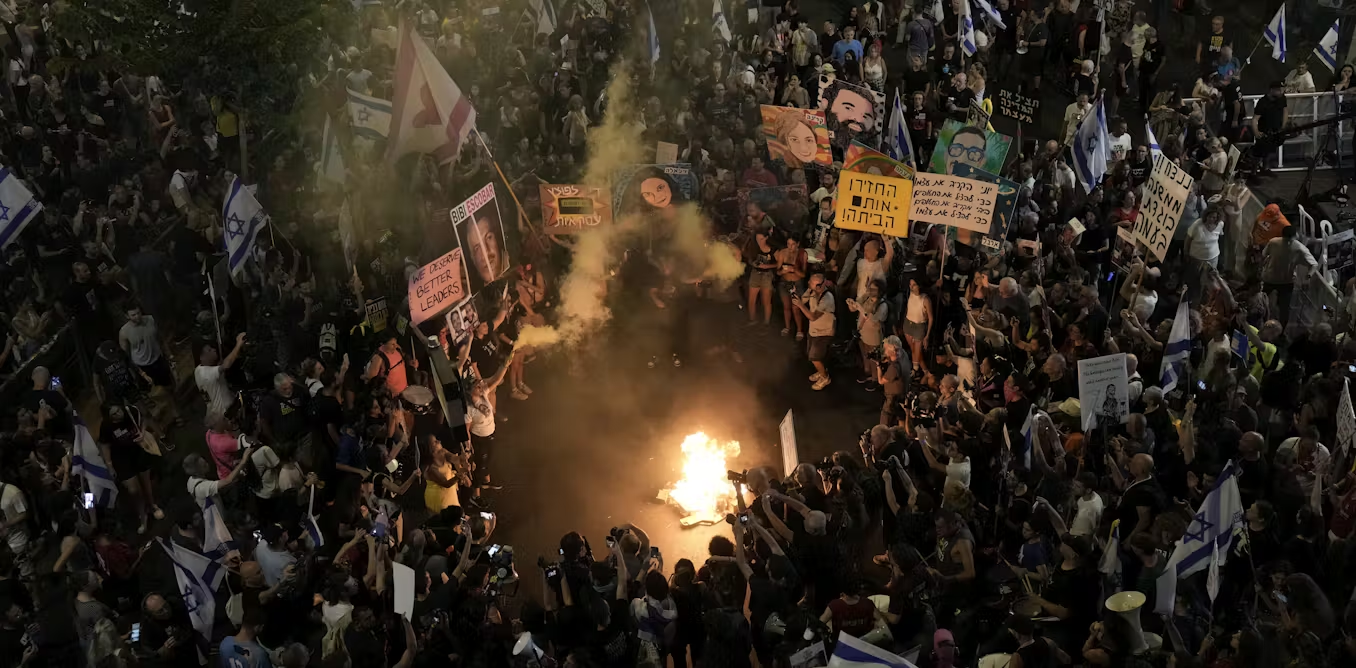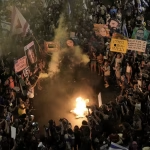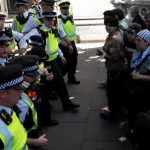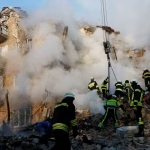The Israel-Gaza conflict has taken another devastating turn, as military escalation intensifies with heavy airstrikes, ground operations, and mounting casualties. Amid this growing violence, one group feels particularly forgotten: the families of hostages still held in Gaza. For months, relatives of those captured during Hamas’s October 7 attack have been pleading with the Israeli government to prioritize their loved ones’ safe return. Instead, many now feel abandoned, as military operations overshadow negotiations.
- The Hostage Crisis: A Painful Reminder of October 7
- Escalation in Gaza: Military Strategy vs. Human Cost
- Families Speak Out: A Movement of Pain and Protest
- Political Calculations in Israel
- International Pressure and Mediation
- Humanitarian Impact in Gaza and the Moral Debate
- What Lies Ahead: Hope, Despair, and Unanswered Questions
- FAQs
- How many hostages are still held in Gaza?
- Why do families say they feel abandoned by the Israeli government?
- What role does international mediation play in this crisis?
- How does Israel justify continuing military escalation?
- What impact has the escalation had on Palestinian civilians?
- Could a ceasefire lead to more hostage releases?
- What do families want most from the government?
- Conclusion
This article explores the families’ grievances, the political calculations behind Israel’s strategy, and the broader humanitarian consequences of escalation. By examining the crisis from multiple angles—political, social, military, and humanitarian—we uncover the deep complexities surrounding the hostage issue.
The Hostage Crisis: A Painful Reminder of October 7
The story begins on October 7, when Hamas launched a surprise attack on southern Israel, killing around 1,200 people and abducting more than 240 hostages. The captives ranged from infants to the elderly, including Israelis and foreign nationals.
While some hostages were released in limited deals brokered by Qatar, Egypt, and the United States, dozens remain trapped in Gaza. Their exact conditions are largely unknown, though accounts from freed hostages describe traumatic captivity—scarce food, poor medical care, and constant fear.
For the families, each passing day without updates intensifies their anguish. “It feels like our government has moved on while our children are still in cages,” one mother told reporters at a protest in Tel Aviv. This sense of abandonment has become the central grievance of the hostage families.
Escalation in Gaza: Military Strategy vs. Human Cost
Prime Minister Benjamin Netanyahu’s government insists that military escalation is necessary to dismantle Hamas’s military infrastructure. Israeli officials argue that weakening Hamas militarily will increase pressure to release hostages. However, families and human rights groups counter that intensified bombing endangers hostages’ lives instead of protecting them.
Israel has expanded its ground operations in Gaza, targeting tunnels and command centers where hostages may be held. Military analysts admit this creates a dangerous paradox: the same strikes meant to weaken Hamas could inadvertently kill captives.
The Gaza Health Ministry reports that more than 40,000 Palestinians have been killed since the escalation began, with thousands of women and children among the dead. This staggering toll underscores the humanitarian catastrophe unfolding, while also fueling criticism that Israel’s approach is undermining prospects for hostage rescue.
Families Speak Out: A Movement of Pain and Protest
Across Israel, the families of hostages have become an organized, vocal force. They stage weekly protests in Tel Aviv, march to government offices in Jerusalem, and confront political leaders at public events. Their message is consistent: bring our loved ones home, before it’s too late.
The Hostages and Missing Families Forum, an advocacy group formed after October 7, has mobilized tens of thousands of supporters. The group warns that each day of inaction risks further deaths. “Our government treats our family members like collateral damage,” one father declared during a rally.
This growing movement has shaken Israeli politics. While many citizens support tough military action, polls reveal increasing frustration with Netanyahu’s inability to balance military objectives with humanitarian obligations. The hostage issue has become a political litmus test for his leadership.
Political Calculations in Israel
Israel’s government faces a difficult dilemma. On one hand, it wants to demonstrate strength against Hamas and reassure citizens that such an attack will never happen again. On the other, it faces immense domestic pressure to secure hostage releases.
Netanyahu’s coalition includes far-right members who oppose making concessions, even if it means leaving hostages behind. Figures like National Security Minister Itamar Ben-Gvir argue that deals only empower Hamas. Instead, they call for intensified military campaigns, regardless of the risks to hostages.
This political split leaves families in despair. Some accuse Netanyahu of prioritizing his political survival over human lives. Critics argue that hostage rescue should not be a secondary objective but the central mission of Israel’s policy in Gaza.
International Pressure and Mediation
Global leaders have urged Israel to prioritize hostage negotiations. The United States, Qatar, and Egypt have repeatedly attempted to broker ceasefires tied to hostage releases. While these efforts have led to some limited agreements, talks often collapse due to mistrust between Israel and Hamas.
President Joe Biden has emphasized that bringing the hostages home remains a U.S. priority, while the European Union has called on Israel to consider humanitarian pauses. However, Israel’s leadership continues to reject long ceasefires, fearing Hamas would regroup militarily.
This diplomatic impasse leaves families clinging to hope that external pressure will succeed where their own government has failed. Yet, as the war drags on, optimism dwindles.
Humanitarian Impact in Gaza and the Moral Debate
The plight of hostages cannot be separated from the broader humanitarian disaster in Gaza. United Nations agencies describe Gaza as “unlivable,” with widespread famine, destroyed hospitals, and millions displaced.
For hostage families, this presents a moral dilemma: while they want their loved ones freed, they cannot ignore the immense suffering inflicted on Palestinian civilians. Some families have joined peace activists in calling for a ceasefire that would both secure hostage releases and halt civilian deaths.
This moral stance has sparked debate within Israel. Hardliners accuse hostage families of undermining national unity, while others see them as the conscience of a society drifting toward endless war.
What Lies Ahead: Hope, Despair, and Unanswered Questions
As the conflict deepens, the fate of the hostages remains uncertain. Military pressure may weaken Hamas but risks killing captives. Negotiations could secure releases but require concessions Netanyahu is unwilling to make. Families remain trapped in limbo, their voices growing louder yet their loved ones no closer to freedom.
The situation raises fundamental questions: Can Israel balance military objectives with humanitarian responsibilities? Can diplomacy succeed where force fails? And how long can families sustain their movement without tangible results?
For now, one truth remains clear: without a dramatic shift in strategy, the families’ fears of abandonment may tragically come true.
FAQs
How many hostages are still held in Gaza?
Exact numbers vary, but Israeli officials estimate that dozens remain captive, including both Israelis and foreign nationals.
Why do families say they feel abandoned by the Israeli government?
They believe that military escalation takes precedence over negotiations, risking the lives of their loved ones and reducing the chances of a safe return.
What role does international mediation play in this crisis?
Countries like Qatar, Egypt, and the U.S. have tried to mediate hostage-release deals, but deep mistrust between Israel and Hamas has repeatedly stalled progress.
How does Israel justify continuing military escalation?
The government argues that weakening Hamas militarily is essential for long-term security and may also increase pressure on Hamas to release hostages.
What impact has the escalation had on Palestinian civilians?
The humanitarian crisis in Gaza has worsened dramatically, with tens of thousands killed, hospitals destroyed, and millions displaced.
Could a ceasefire lead to more hostage releases?
Some experts believe humanitarian pauses or longer ceasefires could create space for deals, though Israeli leaders fear such breaks would allow Hamas to regroup militarily.
What do families want most from the government?
They want the safe return of their loved ones to be treated as the top national priority, not as a secondary objective to military goals.
Conclusion
The families of hostages in Gaza stand at the painful intersection of politics, war, and humanity. Their struggle is not only about the fate of their loved ones but also about the moral direction of Israel itself. As bombs fall on Gaza and political leaders debate strategies, these families remind the world of a simple truth: behind every headline is a human life waiting to be saved.
Unless leaders act decisively—through negotiation, compromise, or innovative diplomacy—the voices of these families risk fading into the background of a conflict already scarred by too much loss.








